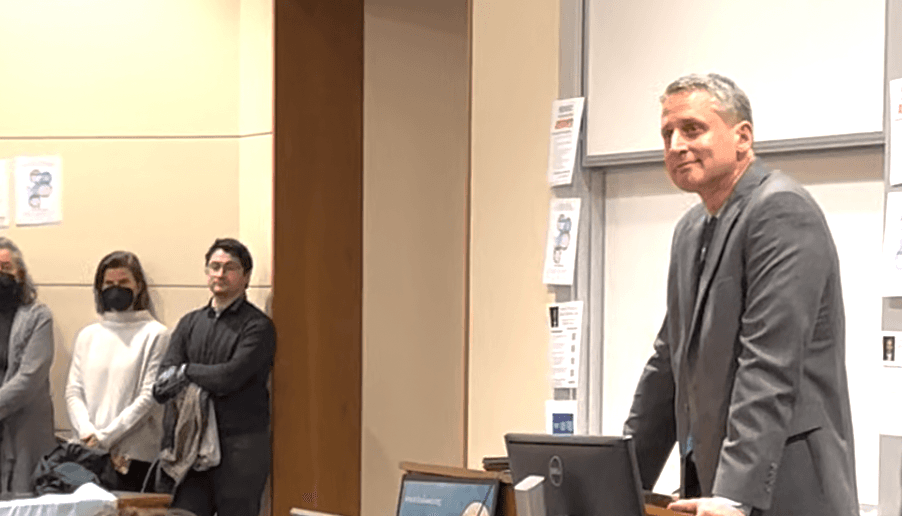Stanford Law ‘Diversity’ Dean Who Allowed Students To Heckle Conservative Federal Judge Placed on Leave
No disciplinary action will be taken against students who angrily protested the presence of a federal appellate judge and prevented him from speaking.

Stanford Law School announced via a ten page memorandum on Tuesday that no disciplinary action will be taken against students who angrily protested the presence of a federal appellate judge, Kyle Duncan, and prevented him from speaking at a scheduled event earlier this month.
The school also said that a dean who abetted the students’ behavior has been placed on leave, and that the school’s faculty will work to review campus free speech policies following the incident. SLS made clear that it stands by the apology it issued to Judge Duncan for how he was treated on campus.
The memo’s author, law school dean Jenny Martinez, said the assistant dean for diversity, equity, and inclusion, Tirien Steinbach, was on leave from her position, although a reason was not given. The statement left ambiguous whether her change in status is related to potential sanctions from the school or the death threats she has received in recent weeks, which are mentioned in the statement.
On March 9, Judge Duncan of the Fifth Circuit Court of Appeals was set to give a talk at the invitation of the school’s conservative Federalist Society. Instead of addressing legal issues as he had planned, Judge Duncan was berated by students for his past rulings.
When the crowd got too unruly, Judge Duncan handed the podium to Ms. Steinbach, who promptly dismissed the judge and praised the students. Ms. Steinbach was widely criticized for her handling of the event.
“I had to write something down because I am so uncomfortable up here. Your advocacy, your opinions from the bench land as absolute disenfranchisement of their rights,” Ms. Steinbach said to Judge Duncan as she pointed to the crowd of students.
“Is your speaking here worth the pain that it has caused, the division it has caused?” she asked. After she finished her remarks, dozens of students walked out of the room, with one calling Judge Duncan “scum” as she walked past the jurist.
Since the event, some students have called for the expulsion of the student protesters, while the demonstrators themselves say they were only exercising their First Amendment rights when they addressed Judge Duncan in the way that they did.
But Ms. Martinez does not believe that to be the case. She allows that “unless we recognize that student members of the Federalist Society and other conservatives have the same right to express their views free of coercion,” the school will be defaulting on its free speech commitments.
Those who protested, Ms. Martinez wrote in the memo, do not have the right to wield a “heckler’s veto.” She defended Judge Duncan’s right to speak to the group in her memo by citing a raft of judicial decisions from both federal and California courts. However, she added the Stanford policies around free speech were unclear and has promised to work with faculty to clarify them.
“I believe we cannot function as a law school from the premise that appears to have animated the disruption of Judge Duncan’s remarks — that speakers, texts, or ideas believed by some to be harmful, inflict a new impermissible harm justifying” the kinds of protests that occurred, she wrote.
Ms. Martinez will now require that every student at the law school take “mandatory educational programming” instead of “referring specific students for disciplinary sanction.”
Dean Martinez argues that the campus-wide programming is a more viable option than singling out individuals for the conduct displayed that day. Video and audio of the event depicted several students peacefully sitting in on Judge Duncan’s event, she said, which would make it difficult to determine who exactly is responsible for the aggressive heckling.
“Even if we could come up with a fair process for identifying and distinguishing between the two categories of students consistent with First Amendment values, the particular circumstances of this event raise additional concerns,” she wrote, including the “chilling” of free speech.
After the incident with Judge Duncan, Ms. Martinez and the president of Stanford University sent a joint letter to the judge to apologize for the way he was treated. That apology, however, sparked nearly as much backlash as the original presence of Judge Duncan himself.
Once the apology was publicized, students peacefully occupied Ms. Martinez’s constitutional law class, donning black clothing and masks. Ms. Martinez and the few students who refused to take part in the silent protests were forced to exit the building down a hallway that was lined with black-clad protesters.
Ms. Martinez notes that the “course I have chosen will not please everyone, not least of which those who have demanded that I retract my apology to Judge Duncan and those who have demanded that students be immediately expelled.”

